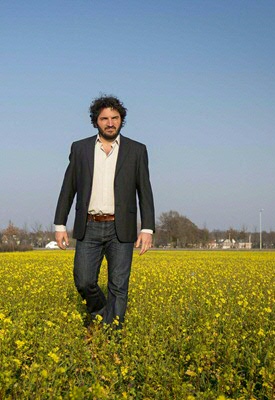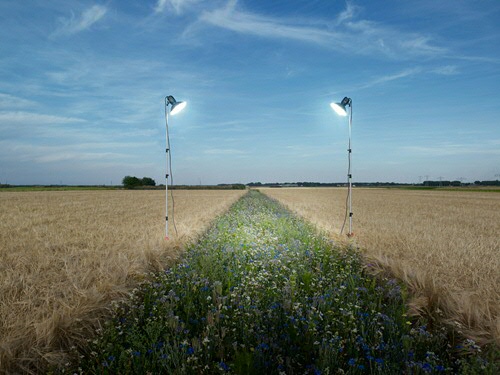Agroecology, following the example of smallholders

The Worldwide Fund for Nature has established a chair in Groningen for Pablo Tittonell. This globe-trotting professor looks for solutions to global agricultural problems in ‘nature-driven farming’, otherwise known as agroecology. Having studied farms of all shapes and sizes, all around the world, he is particularly inspired by the methods of smallholders.
‘Two days ago, I was watching a farmer spraying chemicals less than six metres from where I was sitting’, explains Pablo Tittonell, when asked about the urgency of agroecology. ‘This has a huge impact, even if we can’t see it. We think that the pesticides only land on the crops and in the soil, but they vaporize and the chemicals are spread all over the place.’
Nature-driven farming
Last year, Tittonell was appointed as a professor by special appointment in Groningen. His chair is funded by the Worldwide Fund for Nature. His is an expert in agroecology: nature-driven farming. In farming terms, this means using as few chemical pesticides and artificial fertilizers as possible and avoiding monocultures in arable farming. But it also means that farmers shouldn’t be aiming for the highest possible profits, whatever the cost.
Not viable
After his anecdote about the toxic farmer from Zeeland, Tittonell continued: ‘Another good reason for agroecology is the fact that conventional farming is no longer economically viable. Not only are taxpayers footing the bill for the damage caused by the excessive use of artificial fertilizers, which is leading to high levels of nitrogen in surface water, but the average farmer cannot survive without subsidies from the EU. The costs are simply too high, thanks to the high price of land and the wholesale use of chemicals.’
New koala
On top of the problems of nature conservation and finance, there is also the question of healthy food. ‘The food that we eat is industrial food, stripped of all the properties found in more natural foods. Take corn, for instance. Some people are saying that humans are the new koalas: koalas only eat eucalyptus and humans almost only eat corn. There’s a corn-based component in practically everything we eat. A raspberry sweet, for example, doesn’t actually contain raspberries. It is flavoured by a molecule taken from corn that tastes very similar to raspberries.’ Tittonell refers to the American food journalist Michael Pollan, who once calculated that around seventy percent of what he orders at McDonalds is based on corn – corn-fed cattle, corn oil, corn syrup, etc.

Economic optimum
Tittonell calls it irrational for farmers to strive to make the highest possible profits from their land or dairy farm. ‘The economic optimum is never at the point of the highest returns’, he says. ‘High returns are only possible because of the subsidies that society is paying for. It’s an illusi0n to think that this is efficient. Efficiency is maximizing the difference between income and expenditure. So, we would do much better to sacrifice part of the profits and reduce the costs. But then you hear the counter argument: “We can’t afford to produce less because we have to feed the world.” But hang on – the Netherlands contributes just 0.5 percent of the total global production. I’m referring to the production of grains (wheat, corn, rice, barley, etc.) Grains account for 80% of the calories that people consume around the world. So Dutch farmers wouldn’t feed the world, even if they were to double their yield. Meanwhile, the cost to nature and society is astronomical.’
Organic alternatives
Tittonell does not want to come across as a scientist sitting in an ivory tower, someone who uses his authority to tell people which wasp is the best natural enemy of the insects that ruin their crops. Agroecology must be a bottom-up movement, he says, one in which people search for solutions to difficult questions together. The Argentinian does not want to be dogmatic. In practice, agroecology is a quest for alternatives to mainstream agriculture. Growing crops in rows can reduce the need for pesticides and attract more insects. Using mycorrhiza (good fungi) makes plants more resistant. Organic alternatives to pesticides and artificial fertilizers are on sale, at the rapidly expanding Dutch company Koppert, for example.
Twelve thousand litres of milk
Tittonell was in Friesland last year, looking into a problem among black-tailed godwits. Meadow birds cannot survive in the uniform pastures that cattle farmers cultivate to feed their huge herds of livestock. Meadow birds need moist land, where grass grows alongside flowers and herbs. Tittonell thinks that it should be possible to unite the interests of the farmers with those of the birds, as we did in the past. While carrying out research in Wageningen, he came across an exciting correlation: it would appear that cows need fewer antibiotics if they eat herb-rich grass. This could save farmers a lot of money. But their milk production may drop if pastures can no longer be grown as a monoculture. ‘Let me reiterate: we’re talking about twelve thousand litres of milk per cow per year. Why do we need twelve thousand litres of milk? Who says that this is profitable? Farmers complain about having to sell their milk below the cost price. Of course they do. The cost of producing this much milk is exorbitant.’
Farmers sacrificed
‘Who is benefiting from the current agricultural model?’, asks Tittonell rhetorically. To his mind, it’s not the farmers but the numerous businesses operating on the fringes of the agricultural sector: the food processing industry (including companies such as Unilever and FrieslandCampina), major suppliers (such as Bayer, Syngenta and Nutreco) and lenders such as Rabobank. ‘We’ve sacrificed the farmers by making them sell their produce below the cost price, simply to make the model for the industry economically profitable.’ Despite this, the Argentinian doesn’t like talking in terms of problems. ‘It’s not a dream’, he says, ‘to imagine that in a few years’ time, the farmers in the Northern Netherlands could halve their use of pesticides thanks to ideas from agroecology. I would be tickled pink. Not everyone needs to become an agroecologist, but at least the ideas would be having an impact in practice.’
Curriculum Vitae
Pablo Tittonell is a champion of agroecology. In interviews, he often points out that 50% of the global population is still fed by small-scale farmers, often deploying traditional, organic methods, on 20% of the world’s available farming land. Until 2015, he was a Professor of Farming Systems Ecology in Wageningen. He has held a chair in Resilient Landscapes for Nature and People at the UG, funded by the Worldwide Fund for Nature, since 2019. He also carries out projects for the WWF in countries including Colombia, Brazil and China. In Argentina, he is the national coordinator of a research programme being run by INTA agricultural institute, focusing on natural resources. He is also an advisor to the UN’s Food and Agriculture Organization (FAO).
More information
New Chair at the University of Groningen for Professor Pablo Tittonell
| Last modified: | 28 February 2022 10.34 a.m. |
More news
-
03 April 2025
IMChip and MimeCure in top 10 of the national Academic Startup Competition
Prof. Tamalika Banerjee’s startup IMChip and Prof. Erik Frijlink and Dr. Luke van der Koog’s startup MimeCure have made it into the top 10 of the national Academic Startup Competition.
-
01 April 2025
NSC’s electoral reform plan may have unwanted consequences
The new voting system, proposed by minister Uitermark, could jeopardize the fundamental principle of proportional representation, says Davide Grossi, Professor of Collective Decision Making and Computation at the University of Groningen
-
01 April 2025
'Diversity leads to better science'
In addition to her biological research on ageing, Hannah Dugdale also studies disparities relating to diversity in science. Thanks to the latter, she is one of the two 2024 laureates of the Athena Award, an NWO prize for successful and inspiring...
